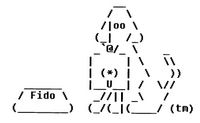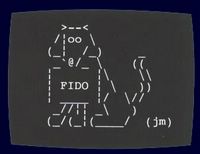The Viditel system was an information system combined with an e-mail service. But the Viditel e-mail service was hardly used. From the start of Viditel e-mail was a problem Most users did not have a keyboard and had to write message in a rather primitive way of writing messages by television remote control and a virtual keyboard on the screen. ; besides, the messages were limited by the page length. For those who later on had a PC and keyboard, e-mail was difficult to integrate with text processing.
The combination of an information system and e-mail system was rather unique as information systems and e-mail systems usually were separate services. With the rise of the PC the importance of e-mail was understood. In 1980 people who knew about e-mail and wanted to use had to get a subscription on the American systems The Source and CompuServe. Professionals could take out a corporate subscription on IBM’s or GEISCO’s networks.
A first attempt to set up an e-mail system in the Netherlands came from Jaap van Till, the godfather of e-mail in the Netherlands. He worked for AKZO Systems and wanted to set up an e-mail service with some professional parties; but the plan did not succeed. But later Van Till was the key player in setting up the Fido system. This system was developed by the American Tom Jennings in 1984. It was a bulletin-board system by which a network of private PCs is set up and e-mails were forwarded at night. In this way the costs remained very low. By 1993 there were more than 50 bulletin boards.


Fido net was named after the dog of Tom Jennings. Two logos.
In 1984 the Dutch PTT started a trial with the e-mail service named Memocom. This service was based on the store and forward software of Dialcom Inc and was since 1980 in use with the British Post Office as the Telecom Gold service. Telecom Gold was very successful as e-mail service in companies. One unsung flagship was the use of the Telecom Gold service by the management of the singer David Bowie in order to stay in contact with the people on tour. But Telecom Gold did also add information services. The first public information service was IDB Online, a daily newsletter for the computer industry by the VNU subsidiary in London.
The PTT trial was held under PTT employees, who used Memocom for internal communication. But the PTT experimented also with a group of sports journalists during a soccer championship. Memocom was launched officially in the Netherlands in 1986. One of the major services on the system was the Rotterdam harbour system Intis, a co-operation of transport companies. It used the system for e-mail traffic and information services. And more publishers followed suit. A publisher used the system to send a daily newsletter with news extracts to expats in Canada and the States. The editorial staff of the VNU publication Telecommagazine produced between 1987 and 1988 a daily newsletter, following the example of their British colleagues.
In 1992 the PTT combined the Memocom department with the Viditel department. The Memocom system was terminated in 1996.

No comments:
Post a Comment